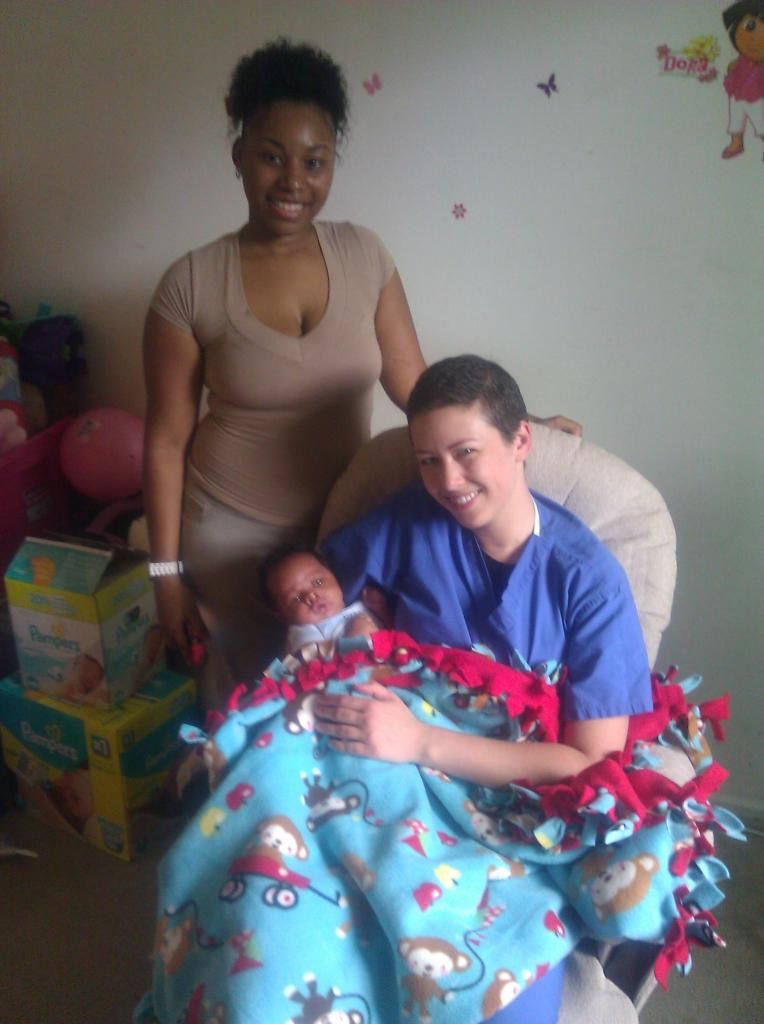Could The Absence of Fully Engaged, High Touch Parenting of Newborns Increase The Risk Of Autism?
Posted on | September 9, 2014 | 2 Comments
Mike Magee
This week, a study, from the Department of Psychiatry at the UC Davis Health System, offered hope to parents of children with autism. The small study of seven children revealed that intervention begun at six months of life resulted in improved outcomes at three years of life. The children included “exhibited marked autism symptoms, such as decreased eye contact, social interest or engagement, repetitive movement patterns and a lack of intentional communication”. Six of the seven caught up with normal peers by three years of age.
Dr.Rickey,
Hinsdale Family Medicine Program, during RCP home visit.
I read the study with special interest considering my role as executive director of the Rocking Chair Project. The effort has partnered with Family Medicine residents around the country who were able to identify economically disadvantaged moms about to give birth, and were willing to do a home visit within 3 weeks of delivery. Where does the rocking chair come in? It is a vehicle for nurturing. The residents train to assemble this gift onsite in the home while sharing concrete information and strategies designed by early childhood experts at “Zero To Three” including the importance of holding, soothing, gazing, engaging and comforting newborns.
As Edward Zigler, PhD Professor Emeritus at Yale has said, “The younger the child at the time of the intervention, the larger the payoff to the child. There can be no relationship without real proximity in which the interaction is characterized by warmth and concern. That’s the Rocking Chair Project.” Harvard’s Professor Emeritus, T. Berry Brazelton adds, “What a wonderful project – to provide rocking chairs for every mother so they can rock and soothe their babies.”
Within this context, what caught my eye in the latest report on the UC Davis website was the authors explanation of the training intervention offered to the children in this study. According to protocol:
“Parents were coached to concentrate their interactions on supporting their infants’ individualized developmental needs and interests, and embedded these practices into all of their play and caretaking, focusing on creating pleasurable social routines to increase their children’s opportunities for learning. Parents were encouraged to follow their infants’ interests and subtle cues and gauge activities in ways that optimized their child’s attention and engagement. The intervention focused on increasing:
Infant attention to parent faces and voices
• Parent-child interactions that attract infants’ attention, bringing smiles and delight to both
• Parent imitation of infant sounds and intentional actions
• Parent use of toys to support, rather than compete with, the child’s social attention
The treatment sessions included:
• Greeting and parent progress sharing
• A warm-up period of parent play, followed by discussion of the activity and intervention goals
• Discussion of a new topic, using a parent manual
• Parents interacting in a typical daily routine with their child while fostering social engagement, communication and appropriate play, with coaching from therapists
• Parents practicing the approach with their child across one or two additional home routines with toys or caregiving activities”
My immediate reaction was three fold:
1. Isn’t this “intervention” simply good parenting? Shouldn’t every child born to loving parents expect this type of treatment from day 1?
2. Is the incidence of autism higher in children deprived of these natural forms of loving engagement with their parents? What are the various causes for parental disengagement independent of socio-economics- competing interests, post-partum depression, lack of knowledge or insight, empathetic deficits etc.?
3. If there is a causal relationship between early parental disengagement and autism in a newborn, should risk identification and preventive intervention be targeted at parents in the pre-natal and immediate postnatal period, as is the case with the Rocking Chair Project, rather than delaying intervention until 6 months of age or later and targeting the child, and cooperating parent?
While this new study offers desperately needed hope, it implicitly sidesteps the question of a causal link between ineffective, non-empathetic parenting from birth and autism, while at the same time suggesting the resolution of the devastating symptomatology associated with the diagnosis can be achieved through a regimen of deliberate, active and empathetic parenting. This is a contradiction that begs further study and clarification.
For Health Commentary, I’m Mike Magee
Tags: autism > autism research > early childhood education > Edward Zigler > health prevention > nurturing > RCP > Rocking Chair Project > T.Berry Brazelton > Zero To Three
Comments
2 Responses to “Could The Absence of Fully Engaged, High Touch Parenting of Newborns Increase The Risk Of Autism?”




September 10th, 2014 @ 10:30 am
Hi Mike – remember me from VSA Board days?
Anyway – I think so much is still unknown about autism that it really isn’t time to draw specific conclusions. I would like to see more research on whether lack of a certain protein or other biological molecules in utero may have an effect on newborn behavior, leading to what we are defining as autism. Parental nuturing is critical for every newborn and growing child. It should not be confined to any particular subset.
I manage a science and engineering internship program for college students with disabilities. Many applicants are on the autism spectrum and each student is unique. Many are now our intern alums.
It’s an interesting condition – let’s be careful with our assumptions.
September 10th, 2014 @ 6:15 pm
Thanks, Laureen for your important comment and your many contributions. I agree completely that we need to be careful about making assumptions. My major point was simply that the intervention that the authors utilized in this study was normal, engaged parenting. In claiming its success as a therapeutic regimen, they beg the question of earlier cause and effect, which could and I believe should be explored. Best, Mike